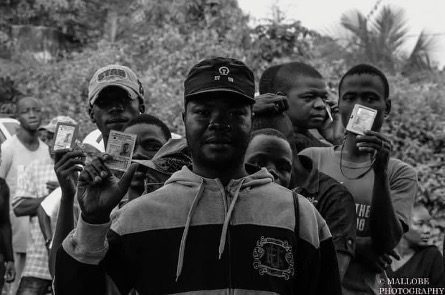NEWS
September 19, 2023

IN BRIEF
For those who have not been to Liberia, their first encounter with an act of corruption is likely to be at the international airport when a service personnel starts asking for a ‘small thing’ or a police officer asks for ‘cold water’ (both phrases refer to a bribe). As dangerous as it is, corruption has almost become the norm for public servants, entrenched in and gradually destroying Liberian society. This article discusses the state of corruption in Liberia and its ripple effects on various sectors of society. Moreover, it emphasizes the crucial role of youth in combating corruption and fostering [...]
SHARE
For those who have not been to Liberia, their first encounter with an act of corruption is likely to be at the international airport when a service personnel starts asking for a ‘small thing’ or a police officer asks for ‘cold water’ (both phrases refer to a bribe). As dangerous as it is, corruption has almost become the norm for public servants, entrenched in and gradually destroying Liberian society. This article discusses the state of corruption in Liberia and its ripple effects on various sectors of society. Moreover, it emphasizes the crucial role of youth in combating corruption and fostering positive change.
Corruption exists at every level of Liberian society, leading to severe consequences. It has resulted in a troubled education system, a deprived public health system, the collapse of government decentralization, and deprived citizens of their rightful social benefits. Accountability Lab Liberia, a leading Civil Society Organization, recently conducted a Corruption Perception Survey, revealing that Liberia’s three most corrupt sectors are education, health, and the judiciary.
Despite the grim situation, several organizations are trying to work with the youth. Still, more is needed to instill moral values in homes, neighborhoods, communities, religious centers, and learning institutions to pave the way for a brighter future. To counter the negative impact of corruption, we must invest in nurturing these young leaders.
How can the youth get involved?
Cultivate a sense of duty and patriotism
Young people should embrace the concept that love for their country goes beyond rhetoric. It’s a practical expression of duty and responsibility. Engaging with leaders and working for their country’s development should begin within their comfort zones, whether in learning environments, neighborhoods, communities, religious centers, or workplaces. These influential settings can help instill a sense of duty and a moral code in youth, enabling them to contribute positively to society.
Embrace knowledge and technology
To combat corruption effectively, young people must be well-informed about its prevalence and effects. They should understand different forms of corruption and its impact on a nation’s growth and development. Technology can play a significant role in this battle. Civil society organizations in Liberia have already created apps like Talkay for citizens to report corruption anonymously. The University of Liberia introduced online course registration and mobile money tuition payment, which has proven effective in stopping corrupt practices. Young people can collaborate with academic institutions, the government, and civil society organizations to develop similar tools to combat corruption more effectively.
Get involved and speak up
Active participation is key. Young people should collaborate with colleagues, community members, and other leaders to hold elected officials accountable. Advocating for stringent measures against corruption and pushing for prosecution through peaceful means is essential. Additionally, youth should engage in political processes and decision-making, as their involvement is crucial to nation-building. Forming student clubs and groups to combat campus-based corruption and extortion is also viable.
Recognize the importance of young peoples’ contributions
Young people bring fresh perspectives, innovative ideas, and boundless energy to the fight against corruption. Their involvement shapes future generations and helps them understand how systems work, preparing them for leadership roles. Everyone is responsible for speaking out against corruption, starting from individuals and extending to homes, religious institutions, schools, and society. Failure to act will perpetuate the cycle of corruption, hindering national progress and allowing greed and selfishness to prevail.
In the battle against corruption in Liberia, the youth are the catalysts for lasting change. Corruption’s pervasive reach has left destruction in its wake, but the potential for transformation lies within the young generation. They must embrace their duty, harness knowledge and technology, and actively participate in political processes to reshape Liberia’s future. Their contribution is pivotal, inspiring a corruption-free Liberia defined by justice, integrity, and progress.
